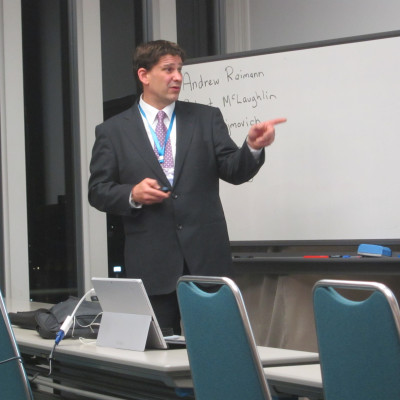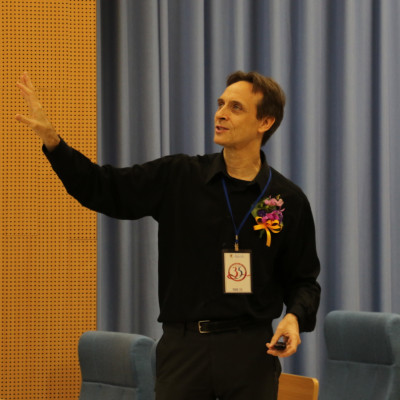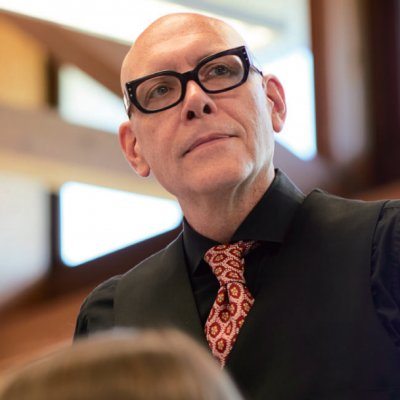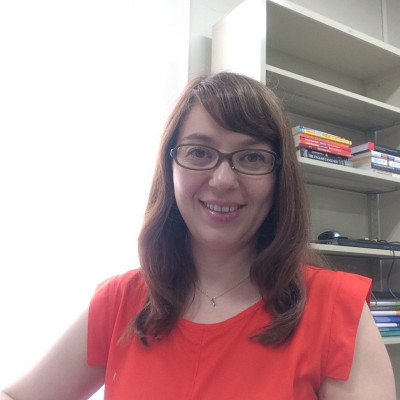Schedule Go Compact (displays all)
You can use Quick Lookup to quickly find sessions. But best is to use the LIVE SCHEDULE during the conference itself.
Social Room #1684
A place to chat and continue conversations after presentations
Opening Address #1680
Opening address - Roxana Sandu, ICLE SIG Founder & Coordinator
Promoting Intercultural Competency in the ESL/EFL Classroom: Connecting Goals with Practical Learning Activities #1676
Language educators often speak of using techniques and activities appropriate for each stage of language learning, but when it comes to incorporating intercultural learning in the language lessons there sometimes is little consideration given to the learners' developmental stages. The consequences of ill-matched activities can lead to little or no growth in intercultural competency, or even reaffirmed and deeper cultural misunderstandings. In this presentation we will discuss how to incorporate and effectively incorporate intercultural learning into the ESL/EFL classroom according to the learners' intercultural developmental stage, age, language ability, and other factors, with activities and techniques grounded in intercultural relations theory and methodology coupled with ESL pedagogy.
The presenter will also share from an English course entitled “Fostering Multicultural Identities” that has been used in various learning environments. Building from the definition of culture as the “learned and shared patterns of beliefs, behaviors, and values of groups of interacting people” (Bennett, 1998) we can say that a multicultural individual is a person who belongs to, or identifies with, a multiplicity of said groups. Breaking the stereotype that culture equals national or ethnic culture is the first step to understanding multiculturalism in a new and unique way. Once learners grasp a more complex concept of culture, they are enabled to see different patterns of separate micro- cultures such as school culture, family culture, work culture, culture shared among sports teammates or a club, etc. This in turn liberates deeper understanding and acceptance of the diverse nature of culture within a given society without having to rely on ethnic or national cultures that permeate the discourse of multiculturalism. Through this presentation participants will learn activities suited to learners’ intercultural development stages, techniques on reframing culture, as well as discover new methods in connecting intercultural learning goals to their own specific EFL/ESL teaching environments while considering intercultural learning objectives.
Lunch Break #1681
Bring your lunch and learn about the ICLE SIG initiatives
Interview with Joseph Shaules #1677
Joseph Shaules (PhD) is an author and educator in the field of language and intercultural education. He is the Director of the Japan Intercultural Institute and is a Specially Appointed Professor at the GIC Center, Keio University, Tokyo. He is the host of the Deep Culture Podcast. Books include: Language, Culture and the Embodied Mind (Springer); The Intercultural Mind (Intercultural Press), and Deep Culture (Multilingual Matters).
Covering Culture in the Pre-service Teacher Practicum #1666
Pre-service teachers attending MA TESOL programs often conduct practicum lessons as part of their degree requirements. Typically, lesson-planning of the practicum is focused on improving teaching skills according to best practices in SLA. Practica given at the university level (where language-focus learning is supplemented with authentic material) can cause pre-service teachers difficulty as they are generally not experienced with CLIL or content-based approaches. The study presented here describes one pre-service teacher tasked with delivering a lesson dealing with how the BLM Movement is interpreted in Japan. The novice teacher needed to design an engaging lesson covering issues related to the topic, such as cultural appropriation, racism and xenophobia. The presenters, the master teacher and the novice, will discuss how they approached the topic and worked to co-design a lesson that served the intercultural awareness-raising purpose of the unit, while still proving insightful as a practicum experience.
A overview of a MOOC for intercultural learning #1667
The presentation outlines a Massive Open Online Courses (MOOC) for intercultural learning, oriented towards intercultural citizenship and Global Englishes. In a context of reduced student mobility, the presentation aims to provide an example of intercultural learning for home contexts. A pedagogical framing of the independent e-learning MOOC, hosted on Moodle, is outlined before an overview of the 10 units: defining culture; intercultural communication; stereotyping; individuals and cultures; exploring own cultures; working with others; global English; English in Japan; English diversity; and, intercultural citizenship. Free access is available for teachers to use the MOOC in their own contexts. Analysis of student reflective writing data on the MOOC will lead to the development of an illustrative example model for intercultural education in home contexts, drawing on related research as part of a Kakenhi-funded project. The aims of the MOOC and subsequent analysis of intercultural learning are outlined in the presentation.
Expressing emotions in intercultural interactions #1665
The recipe to successful intercultural interactions is complicated, but add the expression of emotion (or lack thereof) to this mix, and you end up with an even more challenging ‘recipe’. A lack of emotional involvement in social interactions can be misleading and especially misunderstood in an intercultural setting where interactants bring with them different sociolinguistic and cultural knowledge.
Based on the view that emotions are universally expressed (Ekman, 1972, 2017), one can infer foreign language learners can naturally recognize and express emotions across languages and cultures. However, this may not always be the case, especially if we view emotions as being socially constructed (Barrett, 2012, 2017). When it comes to verbal expression of emotion, one can also assume that it is being constructed in the place of a social interaction, with its meanings being negotiated and interpreted based on interactants’ existent knowledge (pragmatic and sociolinguistic). From numerous informal classroom discussions and observations, I inferred that Japanese English learners avoid the display of emotion in public and prefer to mostly remain neutral in their reactions, both verbal and nonverbal, but are more open to do otherwise when interacting in small groups. Similar observations were made when Japanese English learners participated in intercultural exchanges with international students from various cultural backgrounds. In comparison to the international students participating in the exchanges, Japanese English learners’ interactions seemed flat, lacking the expression of emotion, be it positive (engagement) or negative (resistance). Thus, this presentation will discuss the idea that we all possess an “emotive capacity” (Caffi & Janney, 1994) in our native languages, therefore acquiring a new one when learning a foreign language should be expected. The acquired “emotive capacity” should help us adjust and/or adapt our verbal expression of emotion when interacting with people from various cultural backgrounds.
Intercultural Conversational Strategies in Multimodal Conversation Groups #1668
This study evaluates the effectiveness of a 10-week program in promoting intercultural communicative competence between 88 students from seven different countries. This program leveraged on the versatility of social media apps that allow participants to engage in authentic conversations using video presentations, voice recording and texting. Students were placed in small groups with a leader in each group and the group members were swapped between groups every three weeks. One block consists of 3 weeks and participants were expected to upload a video based on a given topic the first two weeks and plan for a synchronous online meetup on the third week. The uploaded videos act as conversation starters. The cycle repeated for the next two blocks. On the tenth week, a super online meetup was organized for all participants and teachers. It was apparent that the communicative competence of group leaders has a great effect on the interaction dynamics within each group. Details of the program will be delineated in the presentation.
Life in a Box: New Take on Life, Difference and IC #1669
This presentation draws on recent understandings emerging from Brain Science (Clark, 2019; Feldman Barrett, 2021; Lieberman, 2013) to present a new view of the human brain’s interaction with its environment, its reaction to difference, and the role of communication. The presentation begins with a simple premise: “Imagine you lived in a box with just a few holes in it. How would you survive?” From there, it builds to a holistic understanding of human existence in a changing physical and social environment of which each individual can be only partially aware. The concepts introduced are easily comprehensible and can be explained in simple language, forming an accessible introduction for students to a number of key ideas in Intercultural Communication, such as perception, bias, experiential learning, and communication, whilst placing them in the context of everyday experience.
References Clark, A. (2019). Surfing uncertainty: Prediction, action, and the embodied mind. Oxford, UK: Oxford University Press. Feldman Barrett, L. (2021). Seven and a half lessons about the brain. Boston, MA: Mariner Books Lieberman, M. D. (2013). Social: Why our brains are wired to connect. New York, NY: Crown
Cancelled **CANCELLED** Cultural barriers and solutions in work, the workplace and with the workforce #1670
**CANCELLED** How can intercultural communication workshops support professionals in work, the workforce and the workplace? To partly answer this question, examples draw on work conducted over 15 years with students at Concord College, staff at Economic Forums, SMEs and multinational companies in Germany, Japan and France. The perception of culture in working life is an important one for businesses and universities. Consequently, this presentation illustrates how the language of the ‘other’ through cultural myths are neither practical in the workplace nor effective at creating a reciprocal workforce. In response to those myths, this presentation highlights how an L&D approach drawn from HR together with EFL frameworks can offer an important approach to supporting professionals or university students working internationally.
Re-define features for intercultural encounters #1678
After the COVID-19 pandemic closed the spaces we had built for intercultural encounters Regarding interactions, two key questions have emerged. Do we need to re-define spaces for intercultural exchanges? How can we build virtual spaces for exchanges? We conducted online exchanges between students in first year Spanish and Spanish speaking students. This aim of this work is to determine which aspects of intercultural exchange students are missing in the absence of face-to-face interaction, to elicit suggestions for a more natural interaction, and to discover which intercultural nuances can students understand in a virtual environment. As a qualitative research, data taken from a survey conducted after the exchanges is qualified. In practice, the focus is to consider effective ways to build an online space for intercultural encounters. As a theoretical framework, we use the Theory of Cultural-Historical Activity, and we analyze the concept of mediation within the intercultural models we use.
Shared Reality and Cultural Logic #1679
Meaning-making, logic and culture are intimately intertwined. Often when ESL teachers are faced with student essays and reports which seem illogical and incoherent, it is attributed to lack of linguistic abilities. However, meaning is jointly constructed through shared reality; language becomes communication only through implicit agreement of what is real or not.
This presentation will use the theoretical paradigm proposed by Dr. John Conlon for abstract, declarative culture versus concrete, procedural culture, which is based on Edward T. Hall’s foundational paradigm of “cultural dimensions”. These paradigms will be used as a basis to consider what is considered “real” or not “real”, and how this leads to cultural preferences for deductive or inductive logic styles. Derived from 30 years of experience working in cross-cultural academic and business contexts in Japan, examples of Western cultural preference for deductive logic style and Japanese preference for inductive style will be used to illustrate this cultural orientation.
Warp speed in language classes #1671
In interpreter and translator training, great emphasis is placed on the concepts of general untranslatability, linguistic relativity and dynamic equivalence. Even between closely related languages like German and English, there are formidable cultural barriers professionals must overcome. For example, an everyday word like “bread”, can mean something very different across languages and cultures. Untranslatability, is magnified between linguistically distant languages such as English and Japanese or German and Japanese. Most Japanese students naively believe that there are one-on-one equivalents in English for all Japanese words. Consequently, they are confused to find quite a few Japanese “meanings” for one English word in their dictionaries. This presentation seeks to highlight examples of untranslatability and linguistic relativity as they occur in elementary German classes taught at university level, and to show how language learning can enable students to experience and enjoy cultural diversity or the “warp” between cultures.
Holding an international design workshop in the age of Covid-19 #1672
The International Summer Design Workshop has been held annually since 2008. Usually ranging between seven to ten days each time, university students from up to five countries in the Asia-Pacific region work together in intercultural groups of seven to nine. Using English as the lingua franca, each group must be able to handle communication challenges and cultural differences to collaboratively design a product within a specified time period. Until 2019, the location of each workshop rotated among the participating countries. Since the Covid-19 situation began in 2020, the workshop has been held online, relying upon collaborative communication technologies to facilitate the design process. The presenters will describe their experience preparing for and managing this workshop, and the use of technology in both the face-to-face and online environments. Student feedback from previous workshops will also be provided. This project is supported by a Japanese government Kaken grant (21K12564).
PenPal Schools: Connecting Globally #1673
This presentation will introduce an educational website that cultivates intercultural collaborative skills, using examples from work completed by students at a small national university in southern Japan. Computer-mediated communication (CMC) is a popular choice for teachers seeking to incorporate real-world English practice opportunities in the classroom. Among the usual methods, PenPal Schools (https://www.penpalschools.com/) offers something a little different. In contrast to traditional online pen pal websites such as ePals (https://www.epals.com/) where teachers set up writing projects via email or snail mail, PenPal Schools is topic-based and does not have a fixed timeline. This makes it more flexible for teachers juggling time, schedule and syllabus differences. Students are kept safe when navigating the online world through monitored exchanges and a website algorithm that ensures that their respondents are kept within their age range. They learn about a topic through reading articles and watching videos, then respond to the topic and connect with peers via comments. Through these activities, students develop respect for other cultural values, and appreciation for their own.
Intercultural awareness can unlock communication #1674
Classroom silence is a commonly-misunderstood aspect of English language teaching in Japan. Teachers who use communicative approaches can be frustrated and confused by students’ unwillingness to participate, respond, or communicate. Coming to recognize the deep-seated cultural origins of classroom silence can alleviate the confusion greatly (Hofstede, Hofstede & Minkov, 2010), but such an awareness raises questions about how to respond; do we adapt to student reticence, or is it in students’ best interests that teachers defy expectations and simply insist upon greater communicability and interactivity during classes? (Banks, 2016, Harumi, 2011)
This presentation will describe a pre-emptive approach to classroom silence that has resulted in students coming to participate comfortably in direct teacher-student communication. By raising students’ consciousness to intercultural differences in expectations around communicability, and carefully casting reticence in a negative light, the presenter came to have confidence that his students would respond to his questions without the anxiety and reluctance so familiar in Japanese classrooms.
On the Logic of ICLE: An Approach for Textbook and Syllabi Design #1675
Although it could be said that there is a consensus on the kind of topics and themes that commonly comprise what is understood as “Intercultural communication”, the sequential logic by which they should be taught in language education could be seen as a bone of contention. For instance, textbooks such as Shaules’ (2003), Silva’s (2011) and Neuliep’s (2018) seem to point towards the tendency of organizing topics in a deductive manner, starting from the most abstract/general concepts and ending with the most concrete ones. Thus, syllabi design based on these kinds of textbooks may eventually lead to product-based syllabi design (deductive) versus process-based syllabi design (inductive) (Wette, 2018). In this context, the main argument of this presentation is that although experts may understand Intercultural Communication in deductive terms, this may not necessarily be the most expedite way for a language learner to engage with Intercultural Communication themes. Based on evidence that inductive syllabi design presents benefits for language teaching (Prince & Felder, 2007; Takimoto, 2008; Wette, 2018) a tentative model for understanding ‘The Logic of ICLE’ will be explained. First, it will introduce the logic of a single class session, in which culturally shocking stimuli are presented to students with the objective of eliciting a “culture shock before the fact” of sorts. Then, students are presented with a ‘What If Disorienting Dilemma’ (WIDD) which is a pedagogical artifact created as an adaptation of Moran’s (2001) Cultural Knowings and Mezirow’s (2009) Disorienting Dilemma. Lastly, an extrapolation will be made to address how the logic of a single class may inform the overall design logic of an entire syllabus or a textbook.
Closing Remarks #1682
Closing remarks - Roxana Sandu, ICLE SIG Founder & Coordinator









